The Witness Statement of Bjorn Hurtig, Swedish counsel for the defense of Julian Assange - Summary
The original statement is available here, and the supporting documents are here, here, and here. In this document, Mr Hurtig describes the case against Mr Assange to the London defense team as one of the weakest he has ever seen in his entire fifteen year career. In this document London defense Mark Stephens asserts that the Swedish prosecutor sought not just to have Mr Assange imprisoned while under investigation, but also placed in solitary confinement. The key points of Mr Assange's skeleton argument were summarized here.
Mr Hurtig states that the manner in which Ms Ny (the Swedish Prosecutor) has handled Mr Assange's case is not in compliance with the concept of a fair trial.
Mr Assange will most certainly be brought to trial behind closed doors, initially and in the Court of Appeal. Mr Assange, who has endured an avalanche of bad publicity, will be heard with no witnesses to view the weaknesses of the case and thus no opportunity to clear his name. Prosecution witnesses will not be refuted by any new witnesses coming forward, because no one will hear their testimony.
The trial will be heard by a judge and three laypersons who are appointed by, and often members of, a political party.
The trial may be affected by media prejudice caused by the unfair conduct of police and prosecutors. Before the complainants were properly interviewed, and thus before an investigation ought to have begun, a prosecutor told the Expressen newspaper that Mr Assange was being investigated for rape, a serious breach of Swedish anonymity law. Despite this breach, the prosecutor has not been disciplined and the Justice Ombudsman has refused to accept a complaint made against her.
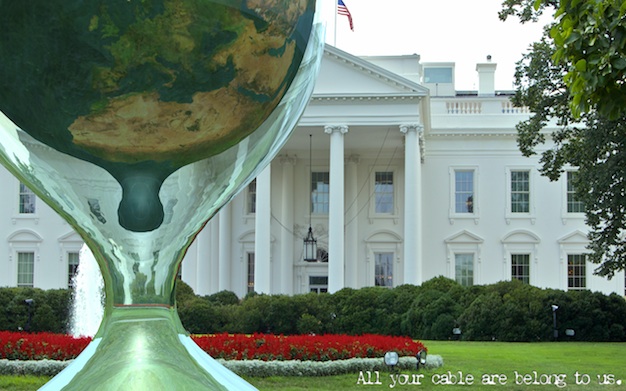 The Telegraph: No 10 urged commander to play down Afghanistan failures
The Telegraph: No 10 urged commander to play down Afghanistan failures
"A senior adviser to Gordon Brown put pressure on the commander of Nato forces in Afghanistan to play down the “bleak and deteriorating” situation to reduce criticism of his government, leaked documents disclose."
The Guardian: Saudi Arabia cannot pump enough oil to keep a lid on prices
"US diplomat convinced by Saudi expert that reserves of world's biggest oil exporter have been overstated by nearly 40%.
The US fears that Saudi Arabia, the world's largest crude oil exporter, may not have enough reserves to prevent oil prices escalating, confidential cables from its embassy in Riyadh show."
El País: EE UU, preocupado por la corrupción oficial en Argentina (The United States worry about the official corruption in Argentina)
"El fenómeno de la corrupción oficial en Argentina preocupa a Estados Unidos, cuya embajada en Buenos Aires envió al Departamento de Estado más de cien despachos confidenciales, a lo largo de varios años, alertando sobre la fragilidad del sistema judicial en el país sudamericano y, consecuentemente, sobre la impunidad de quienes delinquen. (The phenomenon of the official corruption in Argentina worries the United States, whose embassy in Buenos Aires sent to the State Department more than a hundred confidential cables, through several years, warning about the fragility of the judicial system in the South American country and, consequently, about the impunity of those who break the law.)"
Congressional delegation meeting in June 2008 detailed in cable
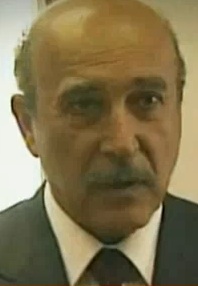 A recently released cable describes three congressional delegation meetings with Egyptian President Hosni Mubarak, Egyptian Vice President Omar Suleiman and Foreign Minister Aboul Gheit. The congressional delegation present at the meetings included Rep. Gary Ackerman (D-NY), Rep. Sheila Jackson-Lee (D-TX), Rep. Thad McCotter (R-MI), Rep. Randy Neugebauer (R-TX), Rep. Russ Carnahan (D-MO), Rep. Al Green (D-TX), and professional staff members David Adams, Jamie McCormick and Howard Diamond.
A recently released cable describes three congressional delegation meetings with Egyptian President Hosni Mubarak, Egyptian Vice President Omar Suleiman and Foreign Minister Aboul Gheit. The congressional delegation present at the meetings included Rep. Gary Ackerman (D-NY), Rep. Sheila Jackson-Lee (D-TX), Rep. Thad McCotter (R-MI), Rep. Randy Neugebauer (R-TX), Rep. Russ Carnahan (D-MO), Rep. Al Green (D-TX), and professional staff members David Adams, Jamie McCormick and Howard Diamond.
The meetings described in 08CAIRO1416, on CODEL Ackerman (“congressional delegation”) posted by Norwegian newspaper Aftenposten focused on Israeli-Palestinian developments (the building of a “calming period”), Egypt’s regional relations, and human rights criticisms of Egypt.
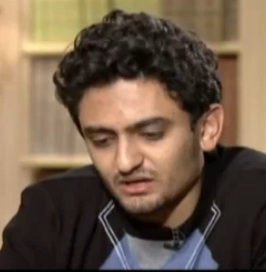
For many in Tahrir Square, his presence was why they had come out February 8. Ghonim, who was released on February 7 by authorities, played a key role in organization demonstrations against the regime before being arrested in late January.
He was seized in the Egyptian capital when he was with tens of thousands of protesters in the Square. Al Jazeera reported Ghonim was "picked up by three plainclothes men on the street, pushed into a car and taken off for interrogation by state security members."
Ghonim has tried to minimize his role in the revolution. He said after his release, "Please don't make me a hero. I'm not a hero. I have been asleep for 12 days."
The Australian attorney general's response to an open letter to the Australian Prime Minister Julia Gillard re Julian Assange
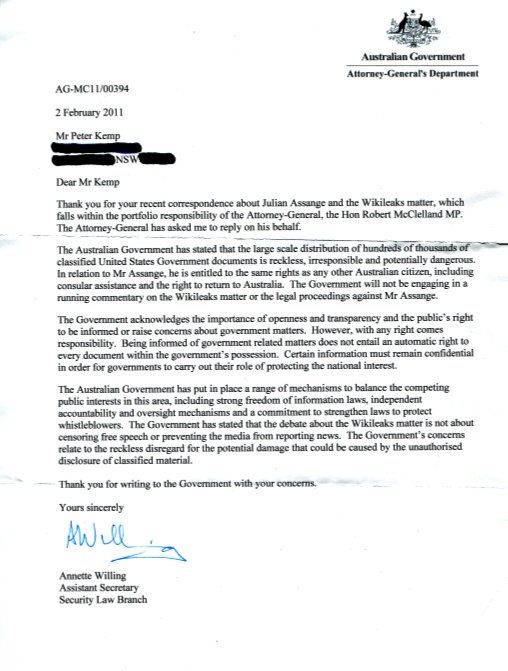
 The Norwegian newspaper Aftenposten has published a set of cables that shed light on Omar Suleiman’s willingness to serve the interests of Israel. The man recently appointed as vice-president of Egypt, according to a cable from 2005, was willing to help former head of security in the Israeli Defense Ministry Amos Gilad by guaranteeing there would be no democratic elections in Gaza in 2006. He was also willing to help Israel better manage the Rafah crossing between Gaza and Egypt.
The Norwegian newspaper Aftenposten has published a set of cables that shed light on Omar Suleiman’s willingness to serve the interests of Israel. The man recently appointed as vice-president of Egypt, according to a cable from 2005, was willing to help former head of security in the Israeli Defense Ministry Amos Gilad by guaranteeing there would be no democratic elections in Gaza in 2006. He was also willing to help Israel better manage the Rafah crossing between Gaza and Egypt.
Cables released also reveal that a key motive for opposing Hamas was a fear that the Muslim Brotherhood would be emboldened. 05TELAVIV5864 details a meeting that Gilad wanted kept secret. Gilad talked about his fear of the Palestinian uprising movement Hamas, which was expected to get a large amount of the vote in the democratic elections in January 2006. Gilad was afraid that Hamas would win the election and that a Hamas win would "destroy everything."
 The Telegraph: Israel's secret hotline to the man tipped to replace Mubarak
The Telegraph: Israel's secret hotline to the man tipped to replace Mubarak
"The new vice-president of Egypt, Omar Suleiman, is a long-standing favourite of Israel's who spoke daily to the Tel Aviv government via a secret "hotline" to Cairo, leaked documents disclose."
El País: Estados Unidos cree que nunca se sabrá si el expresidente chileno Eduardo Frei fue asesinado (The United States believe it will never be known if the Chilean ex-president Eduardo Frei was assassinated)
"El que fuera máximo mandatario entre 1964 y 1970 murió tras someterse a una operación rutinaria de hernia en la que contrajo una infección bacteriológica. (The one who was maximum leader of Chile between 1964 and 1970 died after a routine hernia surgery in which he got a bacteriologic infection.)"
El País: SCENESETTER FOR VISIT OF SPECIAL ENVOY MITCHELL TO DAMASCUS
 El País: El Arma es la Red (The Weapon is the Web)
El País: El Arma es la Red (The Weapon is the Web)
"Los papeles de Wikileaks revelan cómo los blogueros de Egipto iniciaron su rebelión en 2005, se inspiraron en la revuelta de Irán y usaron Facebook para enfrentarse a la dictadura. (The Wikileaks documents unveil how bloggers from Egypt started their insurrection in 2005, got inspired by the one in Iran and used Facebook to face the dictatorship.)"
El País: Guatemala's congress reinstates data protection: the end of the problem that refused to go away
"Guatemala's Congress passed legislation by an overwhelming majority to reinstate data protection for drugs and agrochemicals, paving the way for consideration of the CAFTA in the U.S. Congress. This was the end of a drama played out over years that was fraught with misinformation, conflict of interest, partisan politics, and a pronounced lack of decisiveness by top political leaders. It has consumed in aggregate more of our full-time attention than any other issue in recent months. Most of what follows has been reported in e-mails and, to a lesser extent, cables as we have moved from one operational crisis to the next. Here, we lay out more systematically the extent of the problem, the forces at play, and the efforts of many to succeed on an issue where the easy arguments lie on the other side."
El País: Next steps for Thailand's compulsory license bid
 El País: Objetivo: matar a Osama Bin Laden (The Goal: kill Osama Bin Laden)
El País: Objetivo: matar a Osama Bin Laden (The Goal: kill Osama Bin Laden)
"Arabia Saudí propuso unir las fuerzas de seis países para capturar o asesinar al jefe de Al Qaeda, según revelan documentos secretos del Departamento de Estado de EE UU. (Saudi Arabia proposed to unify the strength of six countries to capture or assassinate the chief of Al Qaeda, according to secret documents from the State Department of the United States.)"
The Telegraph: Why Scots want to stay in the Union
"Scotland would remain part of the United Kingdom for “a generation” because of the economic crisis, the then Scottish secretary told US officials."
The Telegraph: Zardari is a numbskull, British told Americans
"British officials described Asif Ali Zardari, the Pakistani president, as “highly corrupt” and a “numbskull”, according to leaked documents."
The Telegraph: Tony Blair's fees the talk of Beijing
"When senior diplomats met in Beijing to discuss the burning issues of the day, one topic seemed to exercise them as much as any other – the size of Tony Blair’s lecture fees."
Amidst reports from newspapers like the Telegraph that secretary general of the Arab League, Amr Moussa, might be someone who takes over for President Hosni Mubarak, it seems worthwhile to look at what released WikiLeaks cables reveal about the US perception of Moussa. The US has close ties with Egypt and gives much military aid to Egypt. Although the people in Egypt revolting against Mubarak have the upper hand right now, any leader appointed to lead Egypt would likely have some support from the US.
At least since 2006, the issue of who would succeed Mubarak has been a foremost issue for the US. And, as indicated by 09CAIRO874, the US has noted Moussa could be a possible candidate for taking over the presidency:
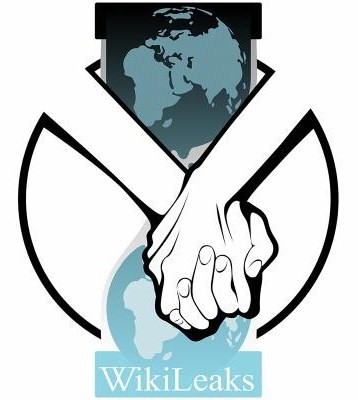 Julian Assange spoke today to a gathering in Melbourne organized by the WikiLeaks Defence Committee and the Australian Media, Entertainment and Arts Alliance, who presented Assange (via his lawyer) with his membership card in the union as a journalist.
Julian Assange spoke today to a gathering in Melbourne organized by the WikiLeaks Defence Committee and the Australian Media, Entertainment and Arts Alliance, who presented Assange (via his lawyer) with his membership card in the union as a journalist.
His filmed address, played to a free-speech forum at Federation Square in Melbourne, touched on a number of WikiLeaks' guiding principles as well as on immediate political pressures on the organization and on Assange himself. Repeatedly, he united those two concerns, principled and practical:
We at WikiLeaks recognize the difference between secrecy and privacy. ... We believe in transparent power, not in transparent people.
Via @Asher_Wolf and @joycelowenstein on Twitter, and Greg Mitchell at The Nation
On January 20, WL Central reported "Bloomberg discloses FBI Contractor admits to Spying on Swedish".
Yesterday, Bloomberg reporter Michael Riley 're-drafts' his flawed article as a magazine story in Bloomberg Business Week.
On the day the original Bloomberg article appeared, Andy Greenberg of Forbes reported that he interviewed Robert Boback of Tiversa about the original Bloomberg article claims:
Poverty and repression under President Ali Abdullah Saleh’s government in Yemen has moved Yemenis to mount an uprising. The “Day of Rage” yesterday was another demonstration intended to force Saleh to resign.
News organizations like NPR have reported since the revolt in Tunisia that Saleh has “ordered income taxes slashed in half and instructed his government to control prices” and “deployed anti-riot police and soldiers to several key areas in the capital and its surroundings to prevent riots.” But those moves have not stopped protests from taking place.
As highlighted in a previous post, Saleh has brutally neglected the needs of his people. According to NPR, “Nearly half of Yemen's population live below the poverty line of $2 a day and doesn't have access to proper sanitation. Less then a tenth of the roads are paved. Tens of thousands have been displaced from their homes by conflict, flooding the cities.”
While Egyptians continue to maintain their uprising against President Hosni Mubarak with a “Day of Departure" today, it is worth looking at what happened in Yemen yesterday. An opposition coalition of Yemenis mobilized in defiance of a plea from President Ali Abdullah Saleh to not protest, rally or engage in any sit-ins, and held their own "Day of Rage."
The protests were considered to be the largest anti-government demonstration that Saleh has “faced in his 32-year rule.” The Guardian reported protesters chanted, “Together we fight against poverty, corruption and injustice.” Given what has been happening in Egypt, the protesters hoped to mobilize in their Tahrir Square, but the government “beat them” to the Square and sent “hundreds of tribesmen to camp out there overnight.”
Protesters called for Saleh to “form a new government” and “let the Yemeni people decide who will rule them in clean, fair elections.”
 El País: EE UU descarta el derrumbe del castrismo (The United States rules out the fall of "Castrism" in Cuba)
El País: EE UU descarta el derrumbe del castrismo (The United States rules out the fall of "Castrism" in Cuba)
"Asegura que, a pesar del endeudamiento y el desabastecimiento en sectores clave, su economía "menos vulnerable" que hace 20 años. ([The United States] assures that, despite the debt and the lack of supplies in key sectors, its economy is "less vulnerable" than 20 years ago.)"
Aftenposten: Burma-Knu: Knu Seeks Preconditions for Talks
"Despite the Burmese regime´s offer reported in Ref A for unconditional talks with the Karen National Union (KNU), which has been waging a conflict against the regime for over 50 years, the KNU placed several conditions on its participation in future talks with the regime during its April 6 meeting with Thai FM Kasit, who has offered to be a facilitator for direct talks between the KNU and the Burmese regime. Though he characterized some of the KNU´s requests as unattainable, Kasit agreed to use them as the starting point for a discussion with Burmese PM Thein Sein he expects to have on the margins of the April 10-12 ASEAN Plus Three and East Asian Summits in Pattaya, Thailand. According to the NLDLA (National League for Democracy Liberated Areas), the exile group that claims to speak for Aung San Suu Kyi´s NLD (National League for Democracy), the FM also, at its request, agreed to explore possibilities for Thailand to serve as a facilitator for discussions between the NLD and the Burmese regime."
Aftenposten: Burma: Struggles at the Top Affecting Relief Effort
 The Telegraph: Sale of uranium mine blocked over Iran fears
The Telegraph: Sale of uranium mine blocked over Iran fears
"The US intervened in the £371 million sale of a Canadian-owned mine in Africa because of fears that uranium ore would be sold to Iran, the leaked cables show."
The Telegraph: British firms made millions from trading with Iranians
"British companies made millions of pounds selling or leasing items to Iranian companies that were the subject of international trade sanctions, US Embassy documents show."
The Telegraph: Vanished FBI officer Robert Levinson 'held by Iranian Revolutionary Guards'
"A former FBI officer who disappeared in mysterious circumstances in Iran four years ago has been held by the country’s Revolutionary Guard, the cables suggest."
The Telegraph: William, Harry and the Abramovich of Azerbaijan
"Princes William and Harry are on friendly terms with a young billionaire whose family wealth has been the subject of intense scrutiny by US officials, the documents show."
The Telegraph: Chinese weapons fall into hands of insurgents
This evening two of the editors who worked with WikiLeaks on the publication of the Afghan and Iraq war logs and the diplomatic cables, Alan Rusbridger of the Guardian and Bill Keller of the New York Times, will discuss their interactions with WikiLeaks on a panel hosted by the Columbia University Journalism School in New York City.
Jack Goldsmith, the former assistant attorney general who raised alarms within the US Department of Justice about DoJ legal opinions on torture and now a Harvard University law professor, will join the panel as discussant. The panel will be moderated by Emily Bell, director of the Tow Center for Digital Journalism at CJS.
In a recent tweet, WikiLeaks referred to some members of the panel as its "detractors."
The panel will be livestreamed at the CJS site at 7 pm EST.
Greg Mitchell will be doing a book salon chat at Firedoglake at 3:30 PM ET this afternoon.
A little more than two months ago, as in some previous cases, Greg Mitchell started live-blogging when a major story broke. But a funny thing happened with WikiLeaks’ “Cablegate” release: The story, and the reader interest, did not go away after a couple of days—as the cables kept coming out, the controversies spread, and Julian Assange became a household name in America.
One week passed, then another. He started labeling it The WikiLeaks News & Views Blog and giving it a number, e.g. “Day 20.” Then “30.” Echoing the early days of Nightline during the Iran crisis in the late-1970s, He wrote that like America then he was being held “hostage.” When he hit day 50, he joked about topping Joe DiMaggio’s consecutive ‘hit” streak—and on day 57, passed it. Now it’s at Day 68 and counting.
Israel Shamir's recent article on CounterPunch, Redacting Corruption: The Guardian's Political Censorship of Wikileaks, follows on from his previous piece, Paradigm in Belarus: The Minsk Election in a Wikileaks Mirror, in levelling some serious allegations against The Guardian newspaper and its journalistic practices.
The earlier piece was an odd amalgam of politically questionable apologism for the regime in Belarus and invective against The Guardian and the mainstream Western press, part of which provided valuable insight into the selection biases of newspapers (as I documented here) and part of which invoked conspiratorial motives that are unnecessary to explain those same selection biases.
Charges against The Guardian
The newest piece, published on January 11th, presents evidence that The Guardian has been engaging in strange redaction procedures on some of the cables it has been releasing, and infers from this that there is some foul play involved in The Guardian's editorial decisions. Because of Shamir's peculiar status, it is necessary to suject his claims to some scrutiny. As I will outline here, Shamir is mostly correct that The Guardian has been redacting the cables aggressively, and that the result of the redactions is, effectively, to conceal the correspondences of American diplomats writing candidly of a culture of corruption involving British corporations and high ranking officials in the former Soviet bloc. However, odious though this situation is, Shamir's inference to conspiracy or foul play in order to explain these redactions is, I believe, probably too quick.
Theme by Danetsoft and Danang Probo Sayekti inspired by Maksimer